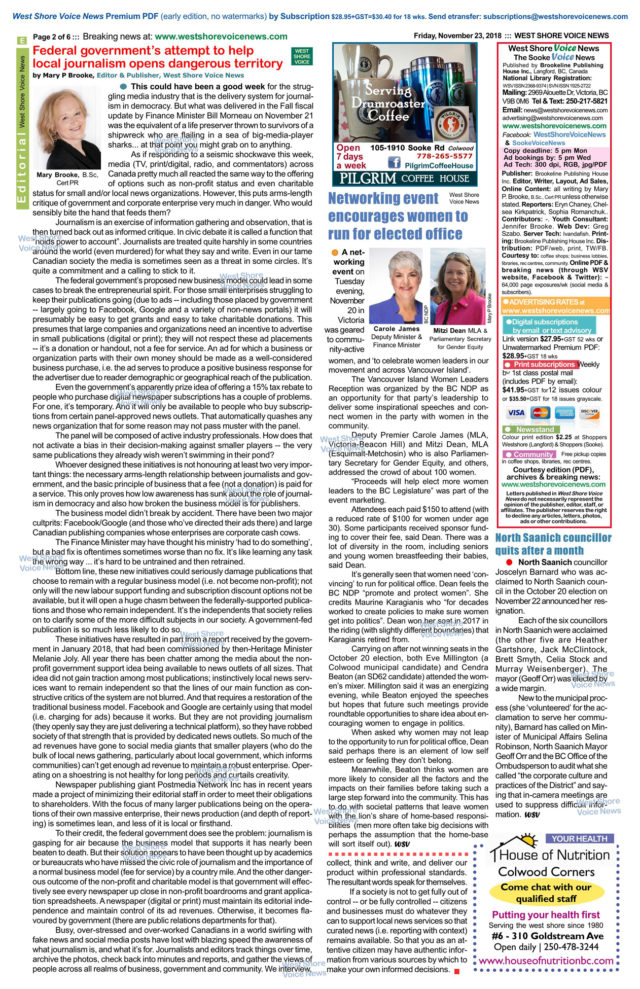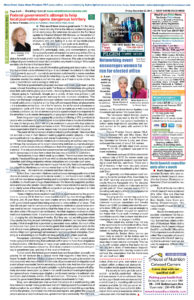
EDITORIAL ~ November 23, 2018 | LANGFORD, BC.
As first published in the November 23, 2018 print-PDF weekend edition of West Shore Voice News
Federal government’s attempt to help local journalism opens dangerous territory
by Mary P Brooke ~ West Shore Voice News
This could have been a good week for the struggling media industry that is the delivery system for journalism in democracy. But what was delivered in the Fall fiscal update by Finance Minister Bill Morneau on November 21 was the equivalent of a life preserver thrown to survivors of a shipwreck who are flailing in a sea of big-media-player sharks… at that point you might grab on to anything.
As if responding to a seismic shockwave this week, media (TV, print/digital, radio, and commentators) across Canada pretty much all reacted the same way to the offering of options such as non-profit status and even charitable status for small and/or local news organizations. However, this puts arms-length critique of government and corporate enterprise very much in danger. Who would sensibly bite the hand that feeds them?

Journalism is an exercise of information gathering and observation, that is then turned back out as informed critique. In civic debate it is called a function that “holds power to account”. Journalists are treated quite harshly in some countries around the world (even murdered) for what they say and write. Even in our tame Canadian society the media is sometimes seen as a threat in some circles. It’s quite a commitment and a calling to stick to it.
The federal government’s proposed new business model could lead in some cases to break the entrepreneurial spirit. For those small enterprises struggling to keep their publications going (due to ads — including those placed by government — largely going to Facebook, Google and a variety of non-news portals) it will presumably be easy to get grants and easy to take charitable donations.
This presumes that large companies and organizations need an incentive to advertise in small publications (digital or print); they will not respect these ad placements — it’s a donation or handout, not a fee for service. An ad for which a business or organization parts with their own money should be made as a well-considered business purchase, i.e. the ad serves to produce a positive business response for the advertiser due to reader demographic or geographical reach of the publication.
Even the government’s apparently prize idea of offering a 15% tax rebate to people who purchase digital newspaper subscriptions has a couple of problems. For one, it’s temporary. And it will only be available to people who buy subscriptions from certain panel-approved news outlets. That automatically quashes any news organization that for some reason may not pass muster with the panel.
The panel will be composed of active industry professionals. How does that not activate a bias in their decision-making against smaller players — the very same publications they already wish weren’t swimming in their pond?
Whoever designed these initiatives is not honouring at least two very important things: the necessary arms-length relationship between journalists and government, and the basic principle of business that a fee (not a donation) is paid for a service. This only proves how low awareness has sunk about the role of journalism in democracy and also how broken the business model is for publishers.
The business model didn’t break by accident. There have been two major culprits: Facebook/Google (and those who’ve directed their ads there) and large Canadian publishing companies whose enterprises are corporate cash cows.
The Finance Minister may have thought his ministry ‘had to do something’, but a bad fix is oftentimes sometimes worse than no fix. It’s like learning any task the wrong way … it’s hard to be untrained and then retrained.
Bottom line, these new initiatives could seriously damage publications that choose to remain with a regular business model (i.e. not become non-profit); not only will the new labour support funding and subscription discount options not be available, but it will open a huge chasm between the federally-supported publications and those who remain independent. It’s the independents that society relies on to clarify some of the more difficult subjects in our society. A government-fed publication is so much less likely to do so.
These initiatives have resulted in part from a report received by the government in January 2018, that had been commissioned by then-Heritage Minister Melanie Joly. All year there has been chatter among the media about the non-profit government support idea being available to news outlets of all sizes. That idea did not gain traction among most publications; instinctively local news services want to remain independent so that the lines of our main function as constructive critics of the system are not blurred.
And that requires a restoration of the traditional business model. Facebook and Google are certainly using that model (i.e. charging for ads) because it works. But they are not providing journalism (they openly say they are just delivering a technical platform), so they have robbed society of that strength that is provided by dedicated news outlets. So much of the ad revenues have gone to social media giants that smaller players (who do the bulk of local news gathering, particularly about local government, which informs communities) can’t get enough ad revenue to maintain a robust enterprise. Operating on a shoestring is not healthy for long periods and curtails creativity.
Newspaper publishing giant Postmedia Network Inc has in recent years made a project of minimizing their editorial staff in order to meet their obligations to shareholders. With the focus of many larger publications being on the operations of their own massive enterprise, their news production (and depth of reporting) is sometimes lean, and less of it is local or firsthand.
To their credit, the federal government does see the problem: journalism is gasping for air because the business model that supports it has nearly been beaten to death. But their solution appears to have been thought up by academics or bureaucrats who have missed the civic role of journalism and the importance of a normal business model (fee for service) by a country mile. And the other dangerous outcome of the non-profit and charitable model is that government will effectively see every newspaper up close in non-profit boardrooms and grant application spreadsheets. A newspaper (digital or print) must maintain its editorial independence and maintain control of its ad revenues. Otherwise, it becomes flavoured by government (there are public relations departments for that).
Busy, over-stressed and over-worked Canadians in a world swirling with fake news and social media posts have lost with blazing speed the awareness of what journalism is, and what it’s for.
Journalists and editors track things over time, archive the photos, check back into minutes and reports, and gather the views of people across all realms of business, government and community. We interview, collect, think and write, and deliver our product within professional standards. The resultant words speak for themselves. If a society is not to get fully out of control — or be fully controlled — citizens and businesses must do whatever they can to support local news services so that curated news (i.e. reporting with context) remains available. So that you as an attentive citizen may have authentic information from various sources by which to make your own informed decisions.
~ MPB


